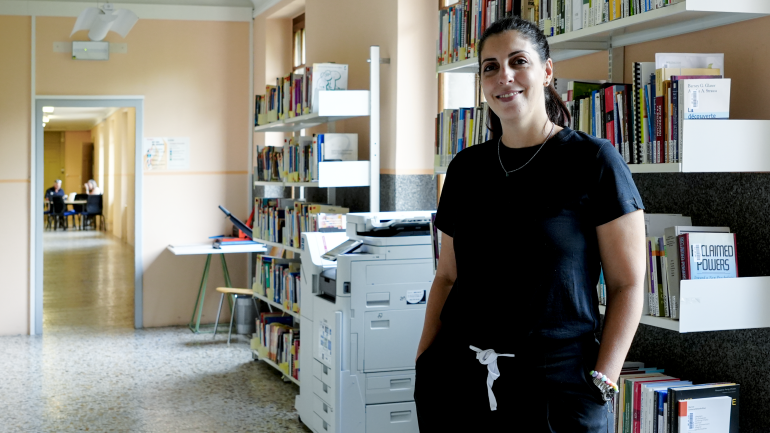
Charikleia Lampraki, a researcher in developmental psychology at the University of Geneva. KA / Centre LIVES
A study by the University of Geneva reveals the crucial role of loneliness in the link between hearing loss and cognitive decline. By combining objective social isolation and subjective feelings of loneliness for the first time, scientists have made a surprising discovery: it is not isolated people who experience the steepest cognitive decline in the face of hearing loss, but those who are objectively surrounded by others yet feel deeply lonely. The findings, published in Communication Psychology, highlight the importance of socioemotional experiences in aging and pave the way for targeted interventions, starting with the destigmatization of hearing aids. Interview with Charikleia Lampraki, a researcher in developmental psychology who led this study.
Your research shows that people who are not socially isolated but feel lonely have a particularly high risk of cognitive impairment. How do you explain this contradiction?
This is indeed our most surprising and paradoxical finding. These people are objectively surrounded by others and have a social life, but they feel fundamentally disconnected. When their hearing deteriorates, their cognitive decline accelerates – more so than in people who are neither isolated nor lonely. Loneliness is the gap between the social relationships we desire and those we actually have. Imagine you're in a crowd, the people around you are talking and laughing, but you don't understand them. You're physically present, but excluded from the interaction.
So the feeling of loneliness is more important than actual isolation?
That is indeed one of our most striking findings. Some people are not objectively isolated – they have social contacts – but they feel lonely. In this profile, we observed that hearing loss was more strongly associated with memory decline than in the reference group, i.e., people who were neither isolated nor lonely. Other disadvantaged profiles, such as isolated and lonely individuals, also performed less well cognitively. Our data cannot explain these differences, but they do indicate that the subjective experience of loneliness is particularly linked to the way in which hearing difficulties and cognitive aging occur together.
How is your study new and different from what has already been done on the link between hearing loss and cognitive decline?
The fact that hearing loss is linked to cognitive problems was already clear. What is new is that we have introduced the social dimension in all its complexity. We combined objective social isolation with a subjective feeling of loneliness. Previous studies focused on one aspect or the other, but not both at the same time. By defining four specific profiles – non-isolated/non-lonely, non-isolated/lonely, isolated/non-lonely, and isolated/lonely – we were able to detect important subtleties that had not been observed before.
What does this mean in practical terms for the older adults concerned?
When screening, it is not only important to know whether someone is objectively isolated, but also how they perceive their social situation. A doctor should not simply ask, "Do you live alone?", but rather, "How do you perceive or feel about your social relationships? Do you miss anyone?" For these individuals – "alone in the crowd", who are already socially integrated – a little help, such as a hearing aid, can be enough to reconnect them and preserve their cognitive health. It's a relatively simple but potentially very effective intervention.
Hearing aids remain stigmatized. How can we change attitudes?
It's really a public health issue. My 63-year-old father, for example, doesn't hear very well. When I talk to him about it, he says, "No, no, I'm fine!" There's this lingering shame, even though no one is offended by wearing glasses. Hearing aids really need to be presented in the same way as glasses: as an everyday tool that is necessary to compensate for a sensory impairment. In the context of an aging population, where 25% of people over 60 have hearing problems, this is a phenomenon that should not be underestimated.
Your study covers 33,000 people monitored over 18 years. What are the methodological difficulties involved in managing such a large database?
It is a huge sample that gives us considerable statistical power. We analyzed data from the European SHARE survey, focusing on 12 countries where the variables we were interested in were systematically collected, including Switzerland. One of the main advantages is the longitudinal follow-up, which is 18 years with the same people being interviewed every two years. This allows us to see the actual progression of cognitive functioning and hearing ability over time, and in particular, to see how these two progressions interact.
Your study stops at observation. What would be the logical next step in this research?
The next step would be an intervention study. We would need to find people with hearing problems, give them hearing aids, and measure whether they feel less lonely and experience slower cognitive decline as a result. A trial like this could confirm our hypotheses and, more importantly, produce concrete public health recommendations. That's what could really make a difference for the millions of people affected.
Interview by Kalina Anguelova
Lampraki, C., Zuber, S., Turoman, N. et al. Profiles of social isolation and loneliness as moderators of the longitudinal association between uncorrected hearing impairment and cognitive aging. Commun Psychol 3, 101 (2025). https://doi.org/10.1038/s44271-025-00277-8

